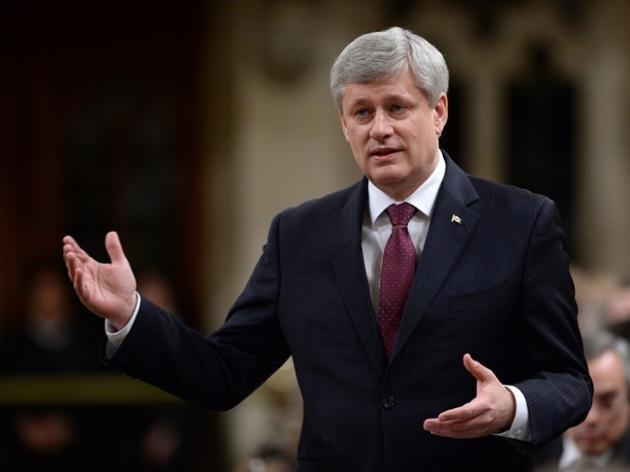 |
| Prime Minister Stephen Harper responds to a question during Question Period in the House of Commons in Ottawa on Tuesday, Feb. 17, 2015. THE CANADIAN PRESS/Sean Kilpatrick |
Canada says it is intensifying economic sanctions against Russian individuals and companies in response to the tense situation in eastern Ukraine.
Prime Minister Stephen Harper says the move is being made in co-ordination with Canada's partners in Europe and the United States in response to what he says is Russia's backing of rebel forces in eastern Ukraine.
"Canada's position remains clear: we recognize the sovereignty and territorial integrity of Ukraine and will never recognize the illegal Russian occupation of any part of the country," Harper said in a statement.
"In co-ordination with our EU and U.S. partners, Canada is once again intensifying its response to the situation by announcing further sanctions against Russian and Ukrainian individuals and entities."
He says 17 Russian and Ukrainian organizations are affected by Canada's latest economic sanctions, including Rosneft — the Russian oil giant.
He also announced sanctions and travel bans against 37 Russian and Ukrainian individuals, including Russia's deputy minister of defence.
The announcement was made late Tuesday before a key rail hub in eastern Ukraine fell to separatist forces.
Harper said the government is monitoring the implementation of the ceasefire agreement reached in Minsk last week, and will "take further action against Russia and Russian-backed insurgents should they fail fundamentally to implement the provisions of this accord."
On Wednesday, Russian Foreign Affairs spokesman Alexander Lukashevich issued a statement suggesting the latest Canadian sanctions were meant to undermine that agreement.
"We assume that Harper's government, which refuses to objectively assess the cause of and the course of events in southeastern Ukraine, is interested in playing along with the 'party of war' in (Kyiv) rather than overcoming the crisis," Lukashevich said.
"Unilateral sanctions as a foreign policy instrument are in contradiction to international law. Regrettably, the basic tenets of international communication are ignored by a government that arrogantly promotes its country's adherence to international law and order."
No comments:
Post a Comment